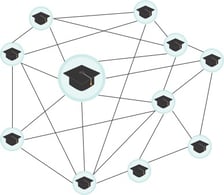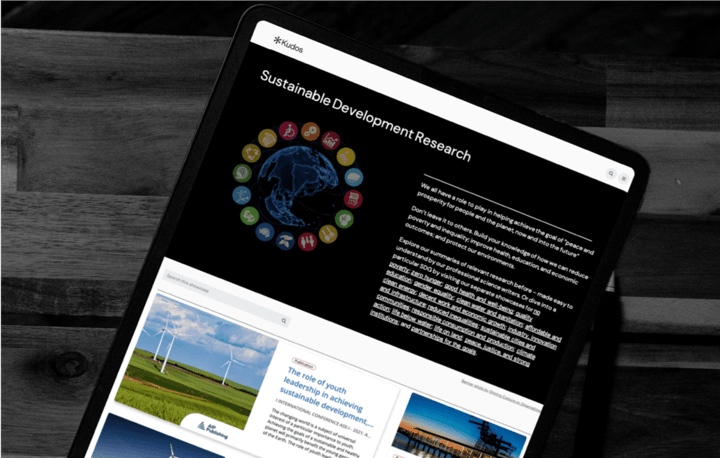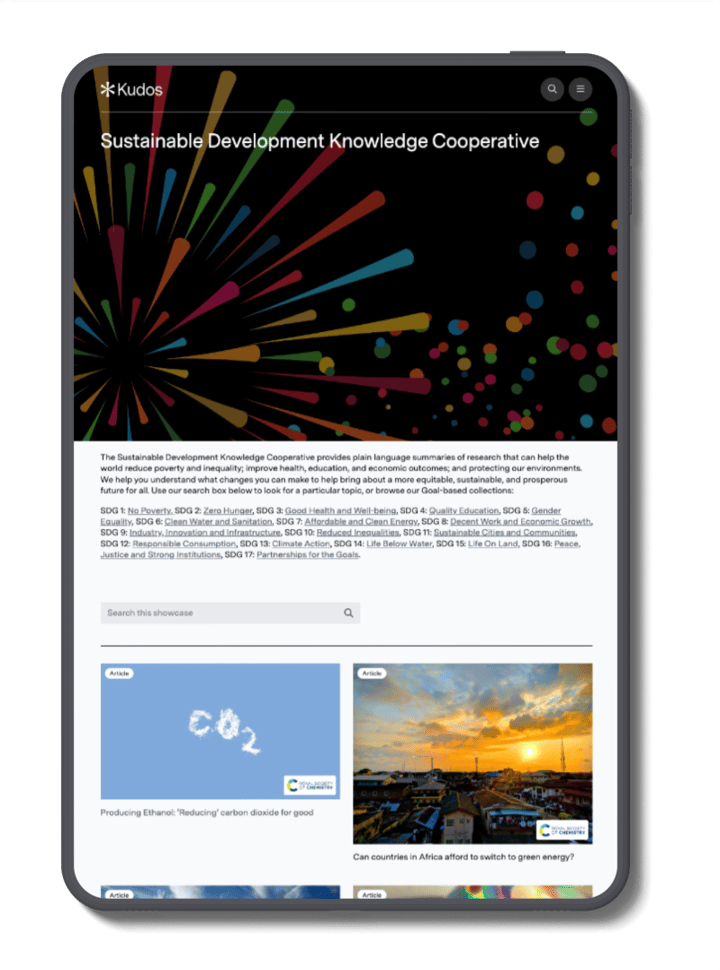 For immediate release, April 4th, 2017 -- Kudos, the award-winning service for maximizing the reach and impact of research publications, has announced headline results from a recent survey of authors’ current sharing behaviours, carried out in partnership with 10 publishers including Cambridge University Press, The IET, De Gruyter and SAGE Publishing. The survey, which had over 7,500 researcher respondents, shows that usage of scholarly collaboration networks (SCNs, such as ResearchGate and Academia.edu), for uploading articles is widespread, and that accessing full text content is the primary reason, ahead of finding and connecting with other researchers.
For immediate release, April 4th, 2017 -- Kudos, the award-winning service for maximizing the reach and impact of research publications, has announced headline results from a recent survey of authors’ current sharing behaviours, carried out in partnership with 10 publishers including Cambridge University Press, The IET, De Gruyter and SAGE Publishing. The survey, which had over 7,500 researcher respondents, shows that usage of scholarly collaboration networks (SCNs, such as ResearchGate and Academia.edu), for uploading articles is widespread, and that accessing full text content is the primary reason, ahead of finding and connecting with other researchers.
The survey asked respondents which scholarly collaboration networks they use, how often, what for (in terms of tasks), why (in terms of value derived), and to what extent they are aware of or observe relevant copyright and sharing policies. Key findings include:
- 57% of respondents indicated that they use scholarly collaboration networks to upload their own work, and 66% use such sites to access otherwise inaccessible content; this was the most common reason given by respondents for using SCNs (61% of respondents indicated that they use SCNs to find and connect with other researchers).
- Of those respondents using ResearchGate, 66% indicated that they use the site at least weekly (26% use it daily, and 84% monthly).
- 83% of respondents agreed or strongly agreed that publisher / journal copyright and sharing policies should be respected, but 60% agreed or strongly agreed that they should be allowed to upload articles regardless of publisher / journal policies; 21% didn’t realize publisher / journal copyright or policies might apply when they are sharing their work in scholarly collaboration networks.
The survey results help to quantify the extent to which researchers are moving beyond the traditional dissemination ecosystem provided by publishers and libraries, and expanding their use of SCNs. It emphasizes the need for publishers to make it easier for authors to maximize the audience for their work, while protecting copyright and ensuring that the total usage of a work can be counted when reporting to institutions and funders.
“Many assumptions are made about the extent to which researchers use scholarly collaboration networks, and why,” says Mandy Hill, Managing Director, Academic Publishing at Cambridge University Press. “The survey had fascinating insights for us in terms of how our authors derive value from these services. It’s reassuring to see that the continued growth in their use is nonetheless matched by a continued respect for copyright - this helps us understand the context that will shape our evolving support for sharing.”
“Helping authors share information about their publications to broaden readership and increase impact is at the heart of what we do,” said Melinda Kenneway, Executive Director of Kudos. “We believe there are many ways that authors can be supported in this goal while still respecting copyright - which they clearly value. Kudos has been helping authors here for a few years now, but more can be done. We’re looking forward to discussing these survey results with our 80 publisher partners and seeing how we can assist them in supporting their authors in gaining maximum exposure for their work, without infringing copyright, while also tracking and accounting for offsite usage."
The survey was coordinated by Kudos, and sponsored by ASTM International, Cambridge University Press, De Gruyter, Duke University Press, The IET, John Benjamins Publishing Company, OECD, SAGE Publishing, Taylor & Francis and Wichtig. All career levels, subject areas and global territories were represented in the responses but the most strongly represented groups were early career researchers (39% of respondents were within 1-10 years of completing PhD), and those from Europe (40%) and North America (18%). Scientific, technical, engineering and medical researchers made up 64%, with social science and humanities researchers comprising 36% of respondents.
---ENDS---
Contact:
Charlie Rapple
charlie.a.rapple@growkudos.com
+44 1865 872527
Over 130,000 researchers have signed up to use Kudos’ free platform for managing communications around their publications – across multiple publishers and tools. They explain work in plain language and generate trackable links for sharing via email, web and social / academic networks; these enable communications to be directly mapped against views, downloads, altmetrics and citations. Kudos thereby provides researchers, and their publishers and institutions, with a rich understanding of which channels and activities are most effective for broadening reach and impact. Kudos has over 100 organizational customers around the world, including Wiley, Taylor & Francis, SAGE, the American Society for Microbiology, the Association for Computing Machinery, the London School of Economics and Political Science, the University of Helsinki, and ETH Zürich. Recent analysis of Kudos data indicates that full text downloads on the publisher site are 23% higher when the Kudos toolkit is used. Kudos was named Best New End User Product at the 2014 Charleston Advisor Readers’ Choice Awards and won the 2015 ALPSP Award for Innovation in Publishing.



